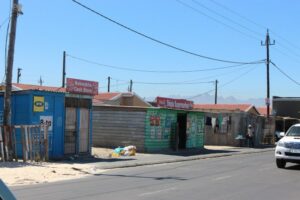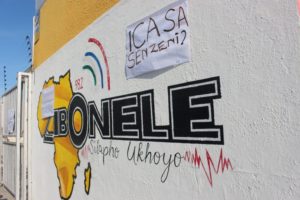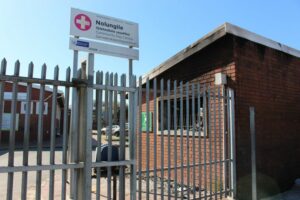
Organised labour and civil society organisations proposed an alternative budget ahead of the third budget speech today by Minister of Finance, Enoch Godongwana. Organised under the umbrella of People Against Budget Cuts, they presented a plan that will tax the rich and ensure more investment in public services instead of austerity measures. The statement by the coalition says that years of budget cuts have “wrecked havoc on our public service as clinics and schools are crumbling, nurses and teachers are exhausted, vital supplies are missing and all because the government would rather implement austerity measures than serve the people”.
Siziphiwe Dunjana, a resident of Khayelitsha and a member of Cry of the Xcluded, said that they now have to stand in much longer queues at the clinic because of the freezing of posts in the health sector and that the homework load for children has increased because teachers cannot cope. “Our children now have lots of homework that we are expected to assist with as parents because the class sizes have increased but the number of teachers has remained the same,” she said.
Nthabiseng Mabaso-Motaung from the Back2Work Campaign said that the Expanded Public Work Programmes are not the answer to unemployment as the jobs they offer are not decent nor pay decent salaries. “I have been working under EPWP since 2014 and we get three-month contracts and do not have benefits. Those who clean the streets under EPWP, they do not get protective gear like gloves or masks but they are expected to do their job,” Mabaso-Motaung said.

The Congress of South African Trade Union’s provincial secretary in the Western Cape, Malvern de Bruyn said they are against the austerity cuts as it affects frontline workers who are supposed to deliver services to the working class. De Bruyn said that the Commission for Conciliation, Mediation and Arbitration (CCMA) has not been spared from budget cuts. “Workers report cases and have to wait for 60 days for the matter to be heard for the first time. On top of that, they have to wait for another three months for the case to be finalised whilst that worker is unemployed and doesn’t have an income. We think that is done deliberately to make sure that we have a CCMA that is not functional,” he said.
“We are saying that the government must tax the rich, tax big business, and that money can be used for the shortcomings in the different public services. As Cosatu we are saying that the government must rise to the occasion and deliver a decisive pro-poor budget that addresses the needs of workers and the nation. We cannot afford another limp budget and the time for bold action is now,” he said.

Zwelinzima Vavi, the general secretary of the South African Federation of Trade Unions, (Saftu) said that value added tax (VAT) is a weapon against the working class and that the austerity measures that the government is implementing are a political choice against the working class. Since it was increased from 14% to 15% in 2018 it has deepened poverty and inequalities, he said.
Vavi called for the expansion of the VAT zero-rated basket of goods beyond illuminating paraffin and sanitary pads to include “tampons and menstrual cups, school uniforms, prepaid airtime and data, public transport fares, cooking gas, basic hygiene products like soap, toothpaste and toilet paper.”
“We also demand a new VAT surcharge on imported luxury goods such as their yachts, their private jets, designer clothing and luxury vehicles. That must be taxed and not bread and public transport,” he said.
Saftu, according to Vavi, wants the corporate tax to be increased to 45% and for a batch of taxes targeting wealth to be introduced. These should include a wealth tax on individuals with a net worth more than R10-million, a solidarity tax on high income earners, a “mansion tax” and higher transfer duties on luxury properties, and a financial transaction tax on speculative capital. He also urged government to stop giving inflation-linked tax relief to the wealthy while workers get wage freezes.
Budget speech 3.0
In his budget speech later in the day, the former trade union leader and now Minister of Finance, Enoch Godongwana announced that VAT will remain at 15% but the fuel levy will increase. Godongwana was adamant that it was not an austerity budget even though he said they were able to avoid “compromising the fiscal strategy of sustainable public finances by reducing additional spending over the medium-term by R68-billion”.
“Let me repeat because there is confusion. We are saying that reducing additional spending is not cutting budget. There is a difference between the two. What we have been fighting in the past three months is how much we should increase the budget and not how much we should cut the budget. So what is being reduced is additional spending,” Godongwana said.
Saftu’s response to the budget speech
In a statement released after the budget speech by Godongwana, Saftu said that the budget is a continuation of austerity measures “despite a marginal spending increase”.
“The 2025 Budget, while offering a modest real increase of 0.8% in non-interest government expenditure,
fails to reverse the deep austerity cuts imposed over the past decade. Our analysis of real (inflation-adjusted) expenditure trends from 2008 to 2025 shows that this year’s increase, although positive, follows more than ten years of real cuts or stagnation,” reads the statement.
The trade union federation further criticised the budget for not fulfilling the promise of expanding on the VAT zero-rated goods like basic meat, dairy products and beans, and above-inflation adjustment to social grants.
“We reject the notion that a 0.8% real spending increase — barely keeping up with inflation and
lower than the population growth rate — can repair the massive damage done by years of budget
cuts. It is not enough new spending to fill the tens of thousands of vacant public sector posts, to
rescue collapsing municipalities, or ensure universal access to quality health and education,” said the union.




